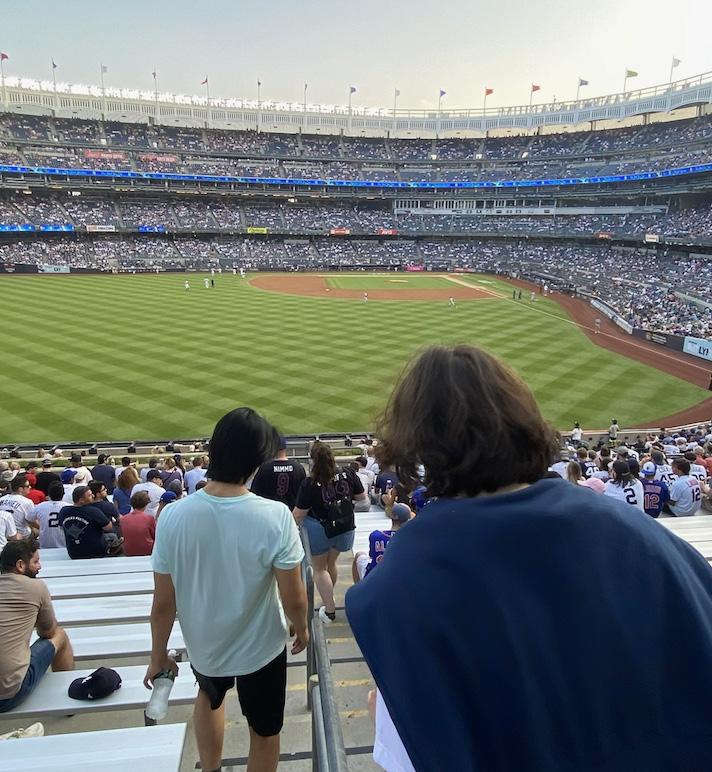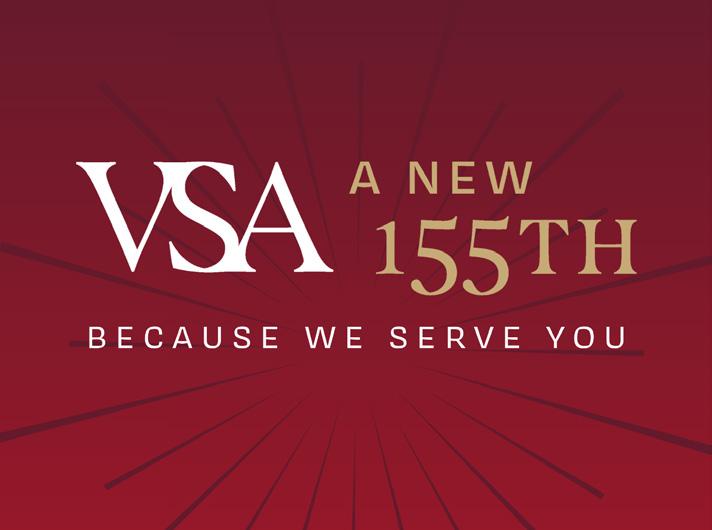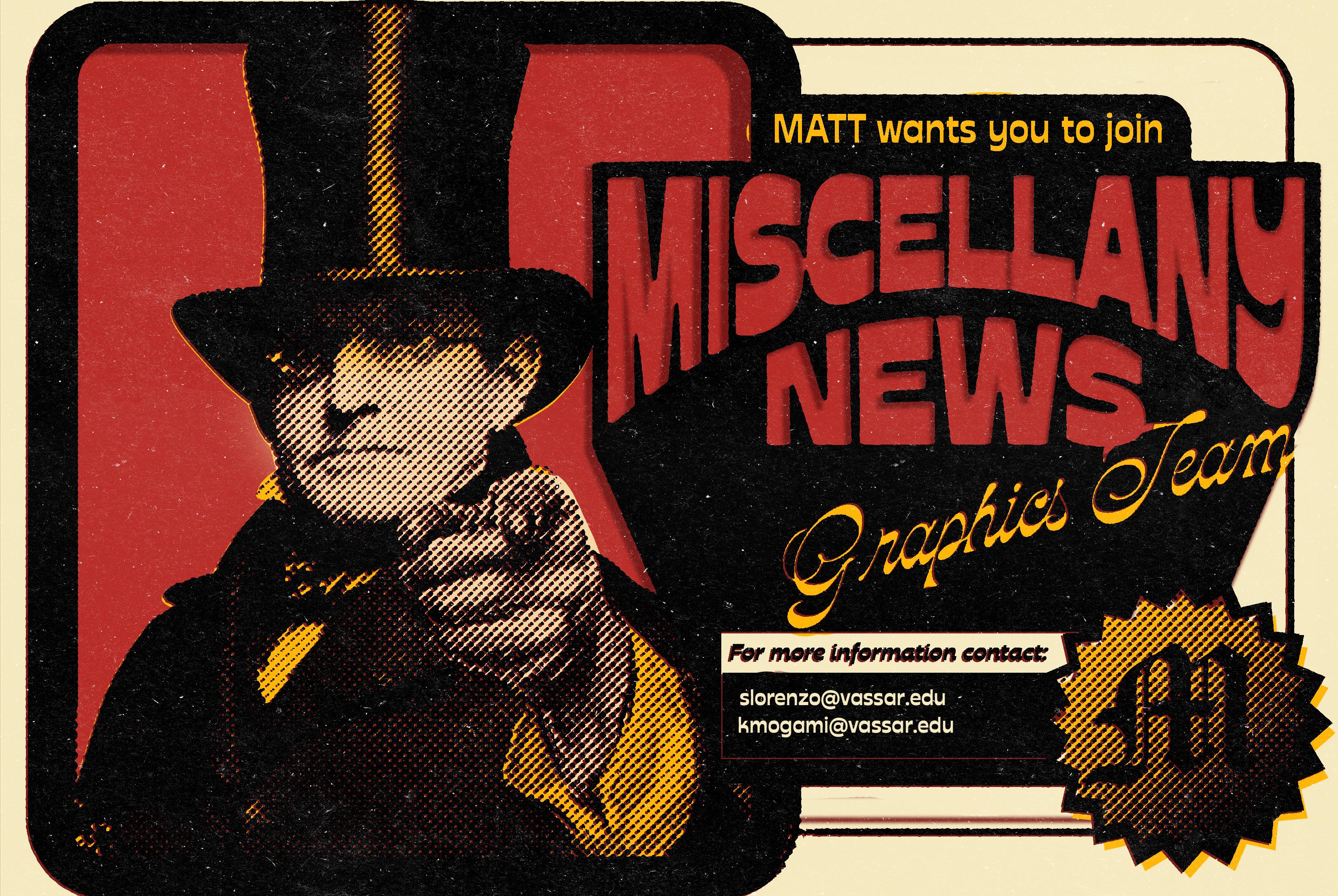Welcome Class of 2027!
Orgs petition VSA funding
Jacques Abou-Rizk, Emma Adams Editor-in-Chief, Features ReporterEvery year, the Vassar Student Association (VSA) votes on a new budget proposal for the following school year and the incoming student government. However, at this year’s vote, many student organizations including the Native American Indigenous Student Association (NAISA) and To Be Determined (TBD), a trans support group, had their budgets reduced to $0. Other orgs, like the Working Student Coalition (WSC), also faced cuts to their budgets. A petition swirled on social media networks and eventually led to statements of resolution from both the VSA and WSC.
VSA Senator for the Class of 2025 Charlie
From said the process is mainly to blame. “They bring up the budget, give people like 30 seconds to look through it, and they call for an objection vote,” From said in a written statement, adding that if there are no objections, the bill is passed. From was the only person who voiced an objection to the bill in the Spring 2023 Senate meeting.
They added, “First, the Senate didn’t have time to actually understand the budget.” From said their attempted objection was ignored and stricken from the meeting min-
SCOTUS restricts admissions
utes because their new Senate position did not begin until the Spring, so they did not have a vote.
According to the incoming VSA President Olivia Gross ’24, these processes are in place for a reason. She remarked, “Since the VSA holds such a large responsibility in the dispersal of almost $1 million of funds per year to student orgs, we need to stick to our rules to ensure we are handling the process fairly and efficiently. The process, in short, includes receiving an application for a budget from each org, and then we will assess their request with what they received the year prior, how they used that money, and what they are planning on using their funds for in the following year.”
Incoming VSA Vice President Emily Doucet ’25 also noted that if student orgs don’t communicate with VSA Finance, then there’s no way to ensure the money is being used to benefit students. She said, “When you defund an organization you stop them from being able to receive funds period, and that simply is not what happened here and any statement suggesting the contrary is just incorrect.”
From shared, “The org budgeting process works differently depending on what org you represent. The orgs at the bottom—the WSC, TBD, and so many others—have to go through
See VSA on page 3
Sarah McNeil News EditorOnJune 29, 2023, the Supreme Court of the United States (SCOTUS) ruled in both Students for Fair Admissions v. Harvard and Students for Fair Admissions v. University of North Carolina that race-conscious admission policies are unconstitutional. The 6-3 decision left many wondering what this means for the future of college admissions both nationwide and here at Vassar.
The 1978 Regents of the University of California v. Bakke case determined admitting students through a racial quota system was unconstitutional. The Bakke case instead found the consideration of one’s racial identity in college admissions policies was permissible when examined holistically and in conjunction with other factors. This effectively established how affirmative action policies could be applied in college admissions. The newest ruling from SCOTUS will no longer permit colleges and universities to formally consider race as a determining factor in admissions, citing a violation of the 14th Amendment’s Equal Protection Clause. However, in Chief Justice Roberts’ court majority opinion he specified one’s racial experience may be considered, stating “At the same time, as all par-
ties agree, nothing in the opinion should be construed as prohibiting universities from considering an applicant’s discussion of how race affected his or her life, be it through discrimination, inspiration, or otherwise.”
Following the landmark decision, President of Vassar College Elizabeth Bradley released a statement to the Vassar community the same day saying, “We are especially concerned about the potentially far-reaching impacts. When California banned affirmative action in 1996, the University of California Los Angeles (UCLA) and Berkeley experienced a nearly 50% decline in enrolling Black and Latinx students, compromising an inclusive learning environment for all students.” Bradley continued, “The rule of law is of paramount importance to our democracy, and Vassar will fully abide by the Supreme Court’s decision while continuing efforts to enroll a diverse student body in keeping with our long-standing values.”
In a written statement to The Miscellany News, Bradley expanded on her previous message to the community, saying, “We are reflecting on our approach and reviewing our policies.” She shared, “Our focus is on ensuring we continue to meet our mission which strives to pursue diversity, inclusion, and See SCOTUS on page 3
Students reminisce and research during summer at Vassar
Carina Cole Assistant Features EditorAlow hum pervades a sticky and sweltering campus during the summer months. In the absence of a large portion of the student population, the quad is more reminiscent of a ghost town than a bustling adolescent metropolis. The only commotion consists of the shrill squeak from a lonesome squirrel or a parent’s pointed quip during a tour.
Unless, of course, one looks a bit more closely at the basements of academic buildings or the living rooms of the townhouse (TH) circle. During the summer, students worked at jobs and internships for a variety of academic and administrative departments. These included the Undergraduate Research Summer Institute (URSI), Beckman and Ford Scholars Programs as well as the Office of Admission, Wimpfheimer Nursery School and administrative positions. Between nine to fives and grueling lab research sessions, there was more than meets the eye on campus during the summer.
For some students, such as Billy Fan ’25, the strict schedule of summer work was demanding yet comforting. Fan worked in a biochemistry laboratory for the URSI program researching a protein called Tau, which is found in correlation to Alzheimer’s and other neurodegenerative diseases. According to Fan, the hands-on aspect of the research was

incredible, “I was able to synthesize and analyze proteins for the first time.” He also added that the lab experience meshed well with his pre-med track.
Some students partook in other academic programs, including Ford Scholars. Ford is a humanities and social sciences driven program. Molly Ardren ’25—a Ford Scholar—researched declining Mexican migration in a post-2008 recession environment and the economic variables that could potentially explain the causes of this event. Ardren thoroughly enjoyed her daily work: “[she] read literature discussing labor markets, immigration policy and the economics/sociology of migrant communities [and] used data from the American Communities Survey and the Mexican Migration Project to make maps and run regressions exploring these topics.”
Beyond the realm of academic research, another group of students, including Catherine Phillips ’26, upheld a standard of tour guide excellence day after day. Phillips primarily led solo tours Monday through Friday, typically leading two tours a day. She noted that the best tour days were when visitors were engaged and receptive with her and days where she got to enjoy time outside and in nature.
Once the long hours on foot or on a lab-swivel chair were over—or, as Ardren noted, when one too many cockroaches scurried too close to her feet while at the computer—
See SUMMER on page 3

The Miscellany Crossword

“WELCOME BACK, VASSAR”
By Sadie Keesbury14. Idea
15. Able to be shifted
16. Trap for slithering fish
17. The American _____ (Manifest Destiny concept)
18. “When are you going to be here?”
19. Vassar’s first dorm
20. Vassar’s dorm with a Rat King
24. Vassar’s newest dorm
29. Times of calm
30. “C’mon man, that’s _____!” (Legendary LeBron quote)
32. Psychoanalyst Erikson and the 1560s king of Sweden, for two
33. Better than expected
34. Fruity dessert
36. Vassar dorm with a “beach”
41. Well-known hummus brand
46. Supervise
47. Equally profound
48. Short goodbyes
49. Vassar’s dorm that housed Meryl Streep
51. Little green vegetables
54. WVKR (Vassar’s radio station) runs this instead of a commercial
55. Show originally helmed by Blake Shelton, Christina Aguilera, CeeLo Green and Adam Levine
60. Vassar quad dorm with a tower
63. Like many bacteria, in shape
64. Future-teller
65. Vassar dorm closest to Blodgett Hall
66. Covers in juice, as a turkey
DOWN
1. Aim a car
2. “Roll back _____!!” (fact checkers cry”)
3. Baton runners, perhaps
4. Alley-_____!
5. Option at Vassar to take a class as pass/fail
6. Org. advocating for STI and HIV testing
7. Loughlin of full house
8. Beauty company sharing a name with Shakespeare’s hometown
9. One plus nine
10. Headwear
11. Baseball stat
12. Football cheer
13. For every
15. Vassar’s version of this is called “Duo” (abbr.)
19. ER professionals
21. _____ Tai, rum cocktail
22. Doc _____ (Spiderman villain)
23. Company that owns San Pellegrino, Poland Springs, and Coffee Mate
24. The same as 5D, don’t forget this option!!
25. Forget about it, in texting slang
26. Yammer
27. That, in spanish
28. Lebanon’s neighbor, for short
30. Minecraft explosive
31. Third most populous city in Ukraine, sharing a name with a Texas town
33. Ash holder
35. Yes vote
36. Make a quick note of
37. Eggs, in Latin
38. Game, _____, match!
39. Mrs., in Spanish
40. Letter after arr
42. Adj. modifier
43. “Cursed ___ that did so!”, Caliban quote from the tempest
44. Aretha Franklin song with spelling
45. Peter or Andrew or James or Matthew
47. Commercials
50. Thurmond and Archibald of the NBA
51. Subatomic particle about 270 times bigger than an electron
52. Vaper’s device
53. Defibrillator letters
55. Tic-_____-Toe
56. “Slide into my DMs”
57. Round lip balm brand
58. The V of DMV, for short
59. _____ Wan Kenobi
60. Occupation
61. Long period of time
62. Used to be
EDITOR-IN-CHIEF
MANAGING EDITOR
CONTRIBUTING EDITOR
SENIOR EDITOR
NEWS EDITOR
ARTS EDITORS
FEATURES EDITOR
ASSISTANT FEATURES EDITORS
OPINIONS EDITOR
HUMOR EDITOR
SPORTS EDITOR
SOCIAL MEDIA EDITOR
ASST. SOCIAL MEDIA EDITORS
PHOTO EDITOR DESIGN EDITOR
COPY EDITOR
ASSISTANT COPY EDITORS
GRAPHICS EDITORS
LIVE EVENTS CHAIR
WEBMASTERS
REPORTERS, COLUMNISTS
Jacques Abou-Rizk
Will Sorge
Monika Sweeney
Sashinka Poor
Sarah McNeil
Allen Hale
Jesse Koblin
Kai Speirs
Carina Cole
Luke Jenkins
Sufana Noorwez
Nicholas Tillinghast
Nick Villamil
Tracy Cen
Olivia Kahn
Richard Lu
Igor Martiniouk
Nandini Likki
Caris Lee
Emma Goss
Julia Weinberg
Sandro Lorenzo
Karen Mogami
Catherine Borthwick
Kai Chang
Michael Yang
Emma Adams
Britt Andrade
Yaksha Gummadapu
Anna Kozloski
Emma Lawrence
Gwen Ma
Jyotsna Naidu
Emma Raff
Oliver Stewart
Anna Terry
COPY STAFF
Kathryn Carvel
Willa Jewitt
Anabel Lee
Allison Lowe
Claire Miller
Ailynn O’Neill
Emma Sandrew
Emma San Filippo
Meera Shroff
Edward Welch Morgan
Tori Kim
GRAPHIC ARTIST CROSSWORD EDITOR
Sadie Keesbury
CORRECTION POLICY
The Miscellany News will only accept corrections for any misquotes, misrepresentations or factual errors for an article within the semester it is printed.
The Miscellany News is not responsible for the views presented within its Opinions pages. Staff editorials are the only articles that reflect the opinion of a two-thirds majority of the Editorial Board.
VSA budget vote triggers protest for clearer org funding

hoops for everything they do while skiing, climbing, equestrian and many others appear to be funded and refunded to the max no matter what they do or their campus impact.”
The petition alleges that despite the reasoning that many orgs didn’t turn in a budget proposal, resulting in their budgets being cut from Annual Budgeting, “What orgs are defunded are chosen selectively by the deeply inaccessible Annual Budgeting Committee. Some orgs, such as Glassar, the stained glass org, didn’t turn in a budget proposal and got more than they spent last year ($375 to $650). Others, such as Beauty and the Beats or Grey Matters, didn’t turn in a budget proposal and got the same or similar budget as last year. So why are NAISA and TBD the orgs that take the fall?”
In a written statement to The Miscellany
News, last year’s VSA President Julián Aguilar ’23 and Vice President Joe Mangan ’23 disputed several of the claims made by the WSC in the petition and online. Notably, they said the orgs in question simply neglected to provide documentation as necessitated. They explained: “To get a beginning balance, an organization must demonstrate that it is active—that is uses money, needs money, and knows how to manage money.”
According to the statement, the orgs in question, including NAISA and TBD, never submitted the required documentation, and hence did not receive funding. “The VSA was not made aware of any upcoming leadership. No budget application was submitted by the outgoing leadership. These organizations had not updated their balance sheets, logged or spent any funds, or reserved any rooms via EMS in the past year,” they elaborated. They
added, “So long as these organizations remain certified, the VSA will always provide access to funding, as we do for all certified organizations. Each organization’s beginning balance is but a tiny part of the overall funding picture: what WSC’s posts and petition notably failed to mention are the $150,000 in Special Purpose Funds that all organizations are able to access, at any time and on an as-needed basis, to support their activities.”
Simon Lewis ’25, a VSA Senator last year, said that his main concern was whether NAISA would be defunded. Lewis said, “Even if NAISA lacks current leadership, it’s important for the VSA to continue to fund them for two reasons. First, so that if students do show up, those resources are immediately available to them, and second, to show Vassar that we expect there to be indigenous students at Vassar and are ready to support from the student
government side of things.”
Doucet has stressed communication during her first few weeks as Vice President of the VSA, saying, “One of our biggest goals to ensure that this confusion won’t happen again is to make the allocations process very clear at treasurer training in the Fall Leadership Conference.”
SCOTUS curtails Affirmative Action, legacy admissions intact
equity as essential components of a rich intellectual and cultural environment in which all members, including those from underrepresented and marginalized groups, are valued and empowered to thrive.”
A week after the court’s ruling, the College held a webinar panel via Zoom for the Vassar community. The panel was moderated by Deputy to the President Wesley Dixon and featured three experts on Affirmative Action: Vassar Professor of Critical Race Theory and Constitutional Law Luke Harris, Associate Professor at the Boston University Law School Jonathan Feingold ’07 and Director of Strategic Initiatives for the African American Policy Forum Sumi Cho. The webinar sought to provide insights into what affirmative action is and is not, survey the social, political and judicial factors that contributed to this ruling, and examine potential next steps for Vassar and its students.
To demonstrate commitment to social justice and equity in the face of affirmative action’s dissolution, Cho said, “[We should be] publicly affirming one’s commitment to racial diversity; discontinuing standardized exams; eliminating financial barriers; strengthening targeted outreach and recruitment efforts; establishing partnerships with community colleges and four year degree pro-
grams; eliminating special preferences such as legacies and athletes etc.; and collaborating with other local, state and federal institutions and agencies.”
Harris agreed, discussing the shortcomings of college admissions saying, “Elite universities have failed to sufficiently expand the terms of the debate to embrace a serious critique of the traditional admissions criteria including the limitations of the usage of standardized tests.” He added, “We should amplify and reinforce the need for holistic admissions and de-emphasize things like standardized exams.”
Feingold advocated for colleges and universities to take this opportunity to modify their current policies saying, “Every institution who really cares about racial diversity should see this as an opportunity to interrogate how its admissions process unnecessarily rewards those with the most inherited advantage.”
In the wake of race-conscious admissions policies becoming impermissible for colleges and universities, legacy admissions—when the alumni status of an applicant’s family member can be used as preferential treatment in admissions—have also come under scrutiny given that the Supreme Court’s decision will not pertain to legacy admissions. Lawyers for Civil Rights, an organization in Boston, has filed a lawsuit against Harvard alleging their
policies give preferential treatment to children of donors who are often underqualified and predominantly white students. The suit has prompted the Department of Education to investigate Harvard’s admissions policies.
Bradley confirmed that Vassar’s current admissions policy allows for the consideration of an applicant’s legacy status: “Legacy status is one factor among many we consider when reviewing our applicant pool. Vassar conducts a holistic review of each applicant and
decision affects an avenue that was in place to grant equal access to underrepresented populations, especially those who may be first generation students.” She continued, “I believe that overturning admissions policies on the basis that they are unfair to the masses should be extended to legacy admissions policies.”
Soren Fischer ’26 expressed similar sentiments saying, “While the conservative perspective on the matter suggests a return to a more merit-based admissions process, this calls out directly to the issue of legacy consideration. There is a large support to end it, especially at elite colleges and universities where disproportionate benefits have been shown towards wealthy and white students.”
a student’s academic record, such as the rigor of their curriculum and their grades, is of primary importance. Historically, less than five percent of Vassar students are legacies.”
Students like Maryam Bacchus ’25 said ruling is a disappointment, “As it stands, the
It is currently unclear what amendments will be made to the current Vassar admissions policy. During the panel, Bradley discussed some actions the college has taken to strengthen their commitment to social justice and equity including Vassar’s need-blind financial aid policy, the recent change to become test-optional last semester, and the college’s Exploring Transfer program that partners with numerous community colleges. Bradley added that the impact of eliminating legacy and athletics in admissions has not yet been evaluated, “We have not really done the analysis to know what the implication of that would be. We certainly will.”
Vassar maintains its spark over the summer break
students had plenty of downtime. Whether strolling through Vassar’s Preserve or hitting wiffle ball home runs, there were plenty of opportunities for fun and relaxation. And, if self-entertainment became too much of a hassle, the college planned numerous events. Fan noted that he particularly enjoyed Taco Tuesday and Trivia Night. Phillips, Ardren and Fan all made their way down to the watering hole at least once during the summer to cool off and splash around. “I always hit my pillow hard, exhausted and excited for the next day,” exclaimed Ardren.
Phillips relished in the luxurious Jewett fourth floor living, explaining that she had a double all to herself. Ardren and Fan lived in a campus TH with other students selected for the URSI and Ford programs. Ardren loved “how close [she] became with [her] housemates.” Fan added that living in a TH was “an ideal living environment” and that coming home after a long day of work and bonding with housemates was a highlight of the sum-
mer.
When not sharing laughs in a TH backyard or kitchen, students spent hours chatting and chewing at a Deece booth. Although, some students, such as Phillips, noted that it was difficult navigating the summer restrictions of the Deece. “We could only enter the Deece three times a day, and Home and Root were the only stations open besides pizza. Since I’m a pescatarian, this was very limiting.” Other students without dietary restrictions had more culinary freedom, with Ardren noting that at the end of the long day “I was pretty hungry and ate whatever they had without a second glance. My housemates wouldn’t just eat anything, they ate everything.”
As the summer marched on and the journeys to the Deece and AFC became routine, trips beyond the safety of Vassar’s campus were planned and carried out. Fan observed that there was no shortage of places to visit. On weekends, he traveled to sporting events in New York City. He fondly recalled trips to Yankee Stadium. Similarly, Phillips traveled
to Brooklyn almost every weekend. She also recounted a particularly fun weekend traveling upstate to Kingston,“I feel like if I didn’t have a car I would have gone insane. I also took two weeks off and got to visit my best friend in Seattle and go home for a week.”
But when downtime was limited during the week, Phillips remarked that working with the admissions counselors was just as much of a treat, emphasizing “I have such high regard for all of [the counselors] and it was satisfying to see that my school has some pretty awesome people involved in accepting the future classes.”
Ardren shared a similar sentiment, explaining how rewarding it was working with Professor of Economics Sarah Pearlman, the Chair of the Department. “Working with Professor Pearlman was enlightening. It was nice to have a woman role model in Economics, which is a predominantly male field, who valued her co-workers and work-life balance. I never failed to be impressed with her breadth of knowledge about Mexican Migra-
tion and economics, as well as her ability to fix the code I had been working on for hours in a matter of minutes without making me feel incompetent. After this summer I am seriously considering becoming a professor myself.” Fan also remarked how caring and knowledgeable the professor he worked with was—Professor of Chemistry and Director of Biochemistry Zachary Donhauser—noting that he gave a fantastic balance of independence and support to him and his lab members’ projects.
As summer came to a close, and each student finished their respective research and job, a concrete certainty solidified: This was a summer well spent. Ardren reminisced, “The nights were always filled with laughter and reminded me a little of spending summer nights at the park with my neighbors and friends as a kid. I was initially worried about becoming bored or homesick, but found myself tearing up as I packed up my room to head back to my parents for a few short weeks before returning to campus in the fall.”
“I believe that overturning admissions policies on the basis that they are unfair to the masses should be extended to legacy admissions policies.”Image Courtesy of VSA.
Things I will/will not miss about small town living
IsMcDonald’s the Mecca of your town? Do all of your high school friends live twenty minutes away from you? Do the people around you casually mention the race of a person they’re talking about for no discernible reason? If you answered yes to any of these, you may be living in a small town, and you may be entitled to compensation. For all of you unaware city folk and for the country bumpkins that might relate, I’d like to document here the pains and maybe a few pleasures of small town life.

The Gym
Nearly every man under 40 in a small town has a gym membership, and why wouldn’t they? There is almost nothing outside of the house to become occupied with. The gym is also simply a nice place to get fit, or a place for men under 40 to meet up with other men under 40. I, as a man under 40, am most enamored that the gym still runs cable television. I can’t get that anywhere else these days besides grandma’s house.
While cable these days means mostly just Big Bang Theory reruns, Marvel movies, and college baseball games, occasionally you get a real programming gem. A few weeks ago I got to watch ESPN’s rerun of the men’s portion of the Nathan’s Hotdog eating contest. No sound, black-boxed captions, and a few hundred hotdogs being eaten—time well spent standing under a mounted television instead of working out. Seeing Joey Chestnut still at his peak is a great pleasure. Muscles atrophy. Joey Chestnut and his fifteen belts are forever. The only real stinker about the gym is that because every man under 40 has a gym membership, I inevitably see every dude I went to high school with there, and they’ve all aged ten years in two years.
The Family Dollar/Dollar Tree next to the Tractor Supply store
A sign for “Family Dollar/ Dollar Tree” appeared on a vacant building at the beginning of summer and suddenly this stupid store was all anyone in town ever talked about. Let me clarify: I am not mad about the existence of such a store in town, but rather mad about the endless banter that has surrounded it. This sort of talk exists in every small town: the discussion of a newly built but incredibly innocuous chain store (Subway, Autozone, Wendy’s...)
Conversations before the opening of the Family Dollar/Dollar Tree were constant and often, more popular than weather talk. It started with, “What’s the deal with the Family Dollar/ Dollar Tree? Remember back when there was a Dollar Tree by the Radioshack and the Blockbuster?” As the summer progressed, it became, “When do you think it’s gonna open? Do you think it’s gonna be a Dollar Tree on one side of the store and a Family Dollar on the other side or is it gonna be all mixed up? Do you think it’s ever gonna open?” Maybe the one interesting wrinkle of this debacle is that Dollar Tree and Family Dollar have conflicting business models. Dollar Tree sells only dollar priced items while Family Dollar will often sell things beyond that price, but maybe me caring about that is just the small- town nut in me writing.
The DMV
This might surprise you, but I legitimately love the DMV. There are very few places on Eearth where you can silently study a random sample of the people that live around you. The DMV is very thorough, too, because no adult in a rural community can avoid it. There’s no music. No chairs to wait in. It’s an incredibly sterile place. All there is to do is to stand and stare at the people in front of you. It’s beautiful. I love the DMV. I only had to go to the
DMV once this summer but I wish I could have gone every day.
Cars
Nick, you might be wondering, how can you hate cars but love the DMV? Here’s the thing: I hate driving. I hate that I have to do it to get anywhere here. I hate that when I go to get my oil change, the guy pulls the metal skewer out at the end and shows me the oil level and I’m supposed to pretend like that means something to me. I hate parking, unless I can pull through to the parking spot on the other side. My friend Dustin calls that a “princess park” (not in a derogatory way, he very much likes doing it).
Half of the time when I try to park, I will get out of the car, see what I’ve done, and turn the car back on to try again. A hundred percent of the time when I try to park, I get out and look at the lines and I immediately sigh at the results, as if I’ve just spilled a large cup of fruit punch.
Not only am I bad at parking, I’m paranoid that someone may someday disappoint or enrage someone upon discovering my parked car. I was walking through a Buffalo Science Museum parking lot with Dustin one time when he suddenly made a big fuss about a car occupying part of an adjacent space. He took out his wallet and pulled out a few paper cards that said things like, “Hey ASSHOLE, your parking is SHIT!” and he put one on the windshield of the car. If I ever found one of those on my car, my self worth would be crumpled.
Pickleball
I like to think of pickleball as tennis, but if it was actually fun to play. Pickleball isn’t necessarily a rural thing but I think it’s partially popular here because of the lack of other entertainment.
“Hey Bill, you wanna hit a plastic wiffleball around for a few hours?” “Sure, I was just gonna stare longingly at the squirrels through my
window all day but that sounds like a blast!” That’s how pickleball was invented, I think. I played pickleball with mostly sixty plussers, and while that may seem lame to some of you, be assured pickleball will eventually come for you in your old age and if we ever face off, I will have years upon years of practice over you. Every week you aren’t playing pickleball now, my power grows.
The Food
If you move to a rural area, expect to eat pizza at least once a week. Want a break from pizza? Maybe try taco pizza this week. The area can’t sustain a Mexican restaurant for more than half a year so taco pizza is the closest I can get to specialty cuisine. Coincidentally, I live within four miles of two Tim Hortons’.
I’m a little bummed that it took me till college to try things like pad thai and ramen, but as much as I complain about the limited selection back home, it’s the same food I will be craving at midnight in my dorm room most nights. I can’t say I’ve longed for Murray’s Chicken this summer.
To be honest, there are parts of all of these things that I will miss at least a little bit, besides maybe the Family Dollar/ Dollar Tree. That can be eaten by termites for all I care. Now if they had built a Fuddruckers…

